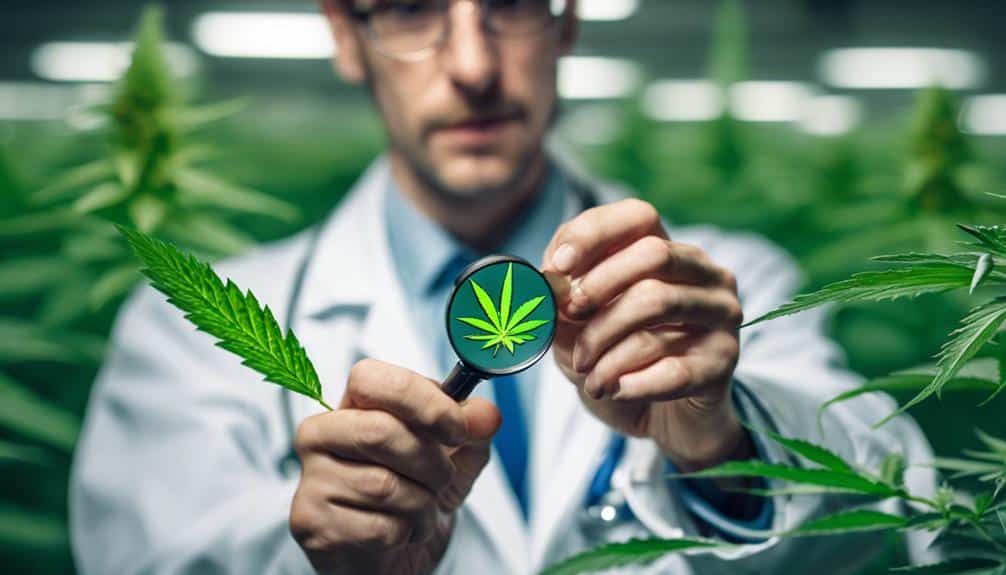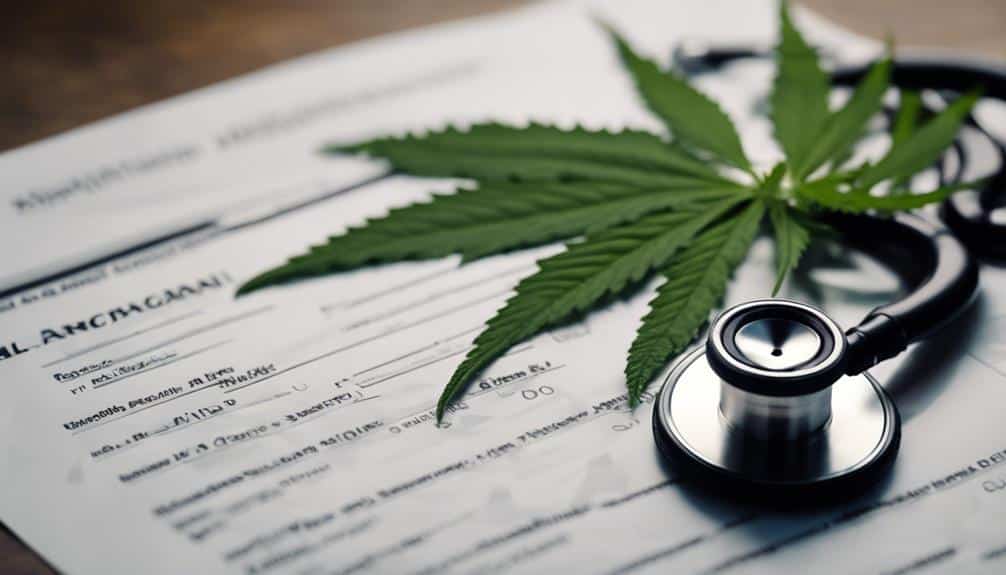Did you know Delaware is one of the states leading the way in the use of medical marijuana for chronic illnesses? You’re likely aware of its general benefits, but what may surprise you is the significant relief it provides to patients dealing with persistent pain, nausea, and anxiety. However, it’s not all smooth sailing. There are obstacles such as accessibility and cost that stand in the patient’s path to relief. Stick around as we delve into the complexities, triumphs, and future possibilities of this controversial treatment within Delaware’s borders.
Table of Contents
Understanding Medical Marijuana

To fully comprehend the potential benefits and drawbacks of medical marijuana, it’s essential to first understand what it is and how it interacts with our bodies. Medical marijuana isn’t just a single substance; rather, it’s a complex matrix of over a hundred different cannabinoid compounds derived from the Cannabis plant—each with its unique effects.
The two key compounds in this matrix are THC and CBD. THC is primarily responsible for creating a ‘high’, but also has therapeutic effects like pain relief and nausea reduction. CBD doesn’t cause a high but has shown promise in managing seizures, anxiety, and inflammation.
However, cultivating marijuana can be tricky due to varying ratios of THC to CBD depending on strain and cultivation techniques. This variation can make treatment with medical marijuana potentially beneficial yet unpredictable. Therefore, while considering medical marijuana as a treatment option remember that each person’s response may differ, and it’s crucial to approach it with an informed, empathetic perspective.
Delaware’s Legislative Journey
Delaware’s journey towards the legalization of medical marijuana is a complex history filled with evolving perspectives and shifting policies. This path has been anything but smooth, with numerous legislative hurdles impeding progress.
In 2011, Delaware launched its medical marijuana program. However, due to federal pushback, the state delayed the program fearing potential repercussions. Such obstacles highlight the difficulties in reconciling state and federal laws on such a divisive issue.
Despite these challenges, Delaware’s policy evolution has been noteworthy. Persistent advocacy and rigorous discussions led to the passage of Senate Bill 17—also known as the Delaware Medical Marijuana Act. This groundbreaking legislation established a comprehensive state-regulated medical marijuana program, demonstrating Delaware’s commitment to providing alternative treatment options for its citizens.
Understanding this journey is vital as it sheds light on the complexities of implementing health-centered policies. It also underscores the importance of persistence in advocating for those who stand to benefit from such policies. Remember that change often comes slowly but can have a profound impact on individuals’ lives—making the journey worthwhile.
Uses in Chronic Illness Management

For many patients battling chronic illnesses, medical marijuana has emerged as a powerful tool in their treatment regimen—offering relief where traditional medications have fallen short. However, it’s not just about using marijuana; dosage determination and strain selection play crucial roles in maximizing benefits and minimizing adverse effects.
Dosage determination is a delicate process as each patient’s needs and tolerance levels vary greatly. Factors such as the severity of symptoms, the patient’s weight, and their previous exposure to cannabis must be considered. It’s often best to start with a low dosage and gradually increase until you find the optimum amount that provides relief without causing discomfort.
Strain selection is equally important. Different strains of marijuana have varying levels of cannabinoids—the active compounds responsible for therapeutic effects. Some strains are better suited for pain management, others for nausea or anxiety. Understanding the unique characteristics of each strain can help select the most suitable one for a patient’s specific condition.
Patient Perspectives in Delaware
In Delaware, chronic illness patients are finding solace through medical marijuana use amidst their debilitating conditions. Their experiences shed light on the practical realities of this treatment option. They’re battling not just their illness but also Delaware’s stigma associated with marijuana consumption—even for medicinal purposes.
These patients demonstrate incredible resilience—advocating for their right to relief from unrelenting pain and discomfort. Patient advocacy groups are also stepping up—combating prejudice, educating the public, and lobbying for broader acceptance and understanding. They’re promoting conversations about medical marijuana—helping shift perspectives.
Patients report improved quality of life, better pain management, and reduced reliance on heavy pharmaceuticals. They’re not claiming it’s a miracle cure but rather a tool in their arsenal against relentless diseases.
Despite positive experiences, challenges persist including difficult access, prohibitive costs, and fear of judgement. Yet these patients persist—fueled by the prospect of relief. Their stories highlight medical marijuana’s potential in Delaware—and provide compelling arguments for its wider acceptance and use. This is the current reality and ongoing effort in the First State.
Medical Community’s Response

The medical community’s response to the use of medical marijuana in Delaware has been largely mixed. Some healthcare professionals acknowledge its benefits while others remain skeptical. Physician training plays a significant role in this discrepancy.
Doctors who’ve received comprehensive training on medical marijuana are more likely to understand its therapeutic potential and support its use. They’ve seen first-hand how it can alleviate symptoms of chronic illnesses—from easing pain to reducing seizures.
On the other hand, physicians with limited training may harbor doubts—often leaning towards traditional therapies instead. They’re more likely to view medical marijuana as an unregulated, risky alternative.
Regulatory compliance also factors into this equation. Some practitioners worry about potential legal repercussions of prescribing marijuana—despite its legality in Delaware. They’re concerned about unclear guidelines and the ever-changing landscape of marijuana laws.
In essence, while some in the medical community see medical marijuana as a valuable tool for managing chronic illnesses, others—due to lack of training and regulatory concerns—remain hesitant. It’s clear that more education and clearer regulations are needed to unify the medical community’s stance on this issue.
Socioeconomic Implications
Beyond the medical perspective, it’s important to consider socioeconomic implications of medical marijuana use in Delaware. A comprehensive cost analysis indicates that it could potentially be a cost-effective treatment for chronic illnesses—providing a shift from high-priced medications often prescribed, thereby reducing the financial burden on both patients and healthcare systems.
Let’s also consider community impact. The introduction of medical marijuana dispensaries can stimulate local economies—creating jobs and increasing tax revenue. While you might think these benefits are concentrated in cities, rural communities can also reap rewards. Cultivation and production facilities can be established in less urbanized areas—promoting local employment and economic development.
Moreover, the use of medical marijuana may help mitigate Delaware’s opioid crisis—indirectly bringing about positive social change. By providing an alternative to traditional opioid medications, we could see a reduction in addiction rates and related societal issues.
Debunking Common Misconceptions

Let’s debunk some common misconceptions about medical marijuana. Misinformation on this topic is vast—often fueled by stigma rooted in outdated and biased perspectives.
You might’ve heard that medical marijuana is a gateway drug leading users to harder substances. However, there’s no conclusive evidence supporting this claim. Most people who use medical marijuana don’t progress to harder substances. Moreover, it’s strictly regulated and prescribed by doctors to alleviate chronic pain and other debilitating symptoms.
Another misconception is that medical marijuana is addictive. However, when used as directed by a healthcare professional, the risk of addiction is low—it’s important to remember that misuse of any medication can lead to dependency issues.
Some believe that medical marijuana isn’t as effective as traditional pharmaceutical drugs. However, ongoing research continues to show its potential in treating a range of conditions—especially where conventional treatments fall short.
As an advocate for health and wellbeing, it’s essential to approach medical marijuana with an informed and open mind. Misconceptions only serve to hinder its potential as a valuable treatment option for chronic illnesses.
Future Projections and Potential
Having dispelled some common myths about medical marijuana, we can now look towards its promising future—exploring the potential it holds for the treatment of chronic illnesses.
The future of cannabis cultivation is bright. More states, including Delaware, are recognizing the medicinal value of this plant and moving towards marijuana legalization. This trend not only allows patients better access to a natural and potentially effective treatment option but also paves the way for more research into the benefits of medical marijuana.
As acceptance grows, we might also see an increased focus on optimizing cannabis strains for specific conditions—leading to more personalized and effective treatments that could drastically improve quality of life for those living with chronic disease.
However, this future isn’t guaranteed. There’s a crucial need for advocacy, education, and continued research to ensure the potential of medical marijuana is fully realized. It’s up to you—and others in the healthcare community—to lead the way. Play a part in shaping this future—you’ll not only be making a difference in your patients’ lives but also contributing to a wider societal shift towards compassionate healthcare.
Conclusion
In light of Delaware’s journey with medical marijuana—it’s clear that it isn’t just a passing trend but rather an evolving solution—a potential game-changer for chronic illness management. Despite hurdles, there’s a growing acceptance and shift in perspective. You’ve seen its impact through patient stories and felt the pulse of the medical community. It’s not without challenges, but with continued education and advocacy, we’re paving a path towards a more enlightened, compassionate future.
Now, I’d like to personally invite you to join this journey with us. Want to learn more? Visit us at Cannabis Docs of Delaware or give us a call at (855) 420-6797. We’re here to answer any questions you might have—we’d love the opportunity to guide you through this new terrain. Who knows—it might just change your life or the life of someone you love. We look forward to hearing from you!

